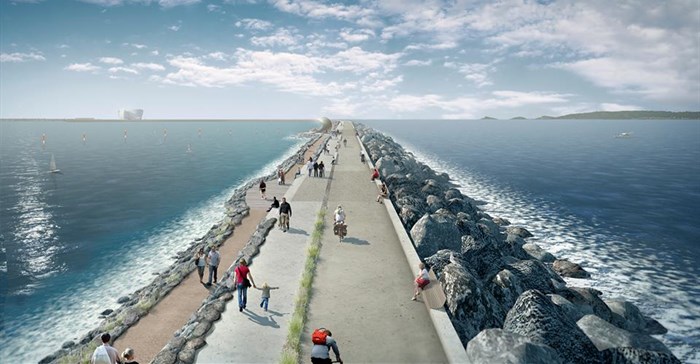
Tidal Lagoon Swansea Bay plc (TLSB) named China Harbour Engineering Company Ltd (CHEC) as preferred bidder for a £300m ($548m, 412 million euros) contract for the proposed plant.
The £1bn project will harness the huge tides from the Severn Estuary that separates England from Wales and generate power to 155,000 homes for 120 years, assuming planning permission is granted.
Prime Minister David Cameron on Wednesday told parliament that tidal power had "significant potential" and said that the Chinese investment was "a win-win for both countries."
CHEC and TLSB have also signed a bilateral agreement to develop tidal lagoon power projects in Asia, particularly at sites along China's 18,000 kilometres (11,200 miles) of coastline.
Around half of the contract value is to be spent on British workforce, partners and supply chain.
Lin Yi Chong, president and CEO at CHEC, said the scheme "could bring the world a new energy option".
"We are proud to have been selected for the tidal lagoon job and look forward to establishing new partnerships in Wales and across the UK," he added.
"We see (it) as the cornerstone project in our business development strategy in the UK and wider Europe".
CHEC is a subsidiary of China Communications Construction Company, the listed state-owned enterprise.
Mark Shorrock, chief executive of Tidal Lagoon Power - TSLB's parent company - said he had "huge esteem for China's delivery capability and ability to deliver projects to time and budget."
"Beginning in Swansea Bay, we aim to foster a new economic opportunity for collaboration in civil engineering between our two companies and nations."
Tidal Lagoon Power says it will require subsidies of about £168 per megawatt hour (MWh), making it significantly more expensive than other low-carbon energy, although its backers hope it would be the first of five more tidal lagoons in Britain.
The project envisages building a 9.5-kilometre (six-mile) seawall fitted with 16 hydro turbines around Swansea Bay, where the waters rise and fall by up to 10.5 metres.
It still needs to win planning permission from the local authority, but if approved would be connected to the national power grid by 2019, providing 495,000 MWh every year.
Source: AFP